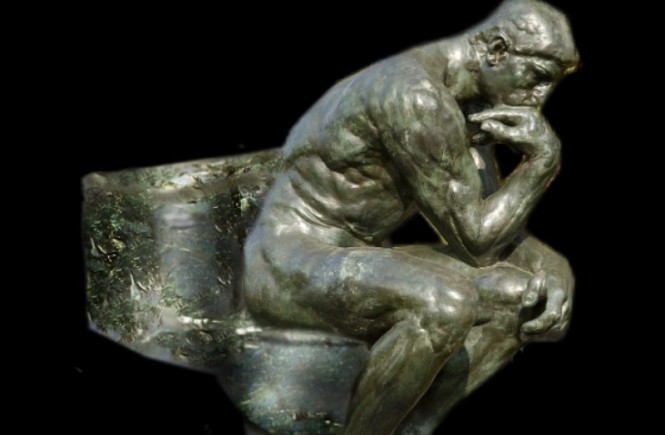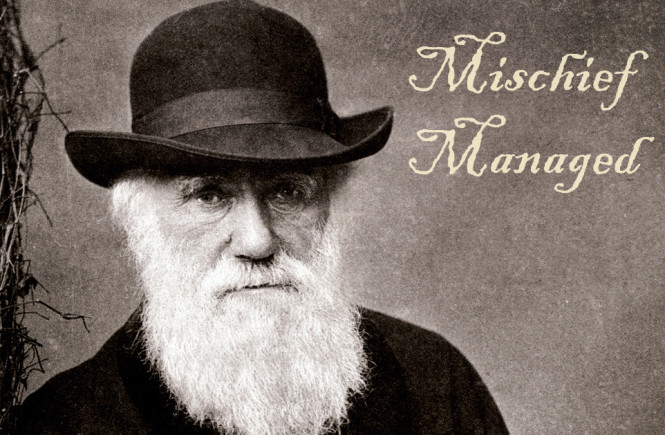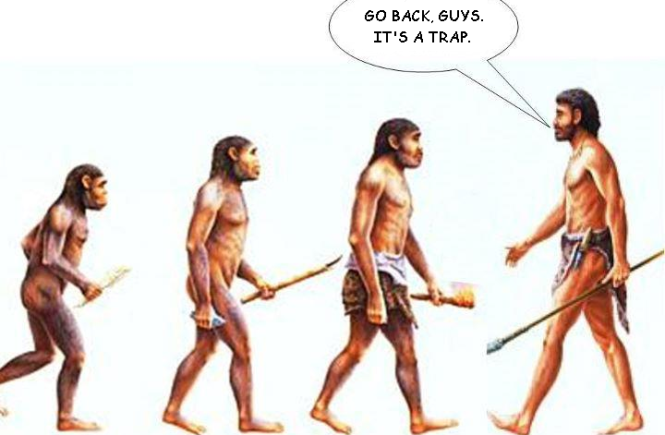Who am I? Ask your bacteria.
The question “Who am I?” has been a mainstay of philosophy for centuries, at least, if we discount “me” as a complete response. It might even be the mother of philosophy, as “who am I?” was probably asked before the more difficult, “why am I?”. Of course, “what do you want to do now?” was probably asked even earlier, but that only led to the birth of the shopping mall.
Thomas Aquinas gave us an answer (cribbed from Aristotle, and then filtered through a theological perspective). He said that we are defined by our body plus our intellect, a soul, and together these two describe who each of us is. These two aspects of ourselves are not distinct entities; the soul, he said, was the form, or principal, that allows our bodies to live. Our soul, he further defined, had an intellectual aspect that was unique to humans. It also has a sentient activity, that is, it could sense and perceive our environment. This part of our soul is shared with animals, and arises from the activity of the body and soul acting as one. The intellectual aspect is unique to humans, he thought. Together, all these defined who we were. Separate they have little meaning.
Attributing our thinking processes to regions of the brain based on a comparison to the brain of more simple animals is in part due to Thomas Aquinas. And the fact that some people really do have a ‘reptile brain’ (they’re called lawyers).
This description of what a human being is has stayed with us, and is still largely in line with Catholic church doctrine. It is in many ways a largely materialist perspective; the soul is dependent on the body, and if the body goes, so does anything that we would think of as being “ourselves”. Divine intervention, he believe, could preserve our sense of self, but the naturalistic aspects of his description matches our modern notions. Even our description of our brain has been shaped by his depiction of a human being. Certain regions of the brain have, until recently, been described as being largely devoted to sensory management and managing the basic works of keeping a body functioning, while the intellect was largely confined to the neocortex. Part of the brain has even been termed the ‘reptile brain’, which supposedly governs the most basic functions of living. Recent advances in mapping brain function are changing this conceptualization of how the brain works, and we know now that our thinking and other neural functions are distributed in complex manners. However the historical compartmentalizing of brain functions based on how our brain compares to that of more simple animals is in part due to Aquinas’s definition of a human.
Four hundred years later, Rene Descartes creates his own theory of self. He begins by famously establishing that he existed (“Cogito ergo sum”, I think therefore I am). Aquinas, understandably, took this first step as fairly obvious and had skipped past it. But emboldened by this beginning, Descartes defined himself as a thinking being. He felt, somewhat similar to Aquinas, that we were composed of a body and an intellect. However Descartes saw these as very distinct entities, and as we are defined by our intellect, the aspect of us that can ask the question “Who am I?” (or as Descartes started, simply “Am I?”) consists solely of the intellect. This is now referred to as Cartesian dualism, and though not a strong part of most modern theories of cognition, we’re hearkening back to it if we talk of someone’s mind “wandering”, or posit the possibility of “out of body experiences”.
Descartes and Aquinas had rationalist approaches to coming up with their theories of self. Basically they found a nice chair and thought rather hard, confident that we are part of universe based on reason and thus we can discover truths through logic. Modern science is empirical, we believe our theories must lie on tested principles. Therefore our modern ideas of self tend to have lots of specifics, but the more grand notions are left out. At least, they’re left out of our published articles. Despite our skepticism, most scientists still have lots of private conceptions of how it all might fit together. Beer is usually needed to draw these out, however.
We’ve always used genetic language to discuss how our personality arises: your good traits come from your mother, the rest from your father’s side of the family.
Genomics has much to say about what defines us, especially if you’re satisfied with a lot of details and can handle the big picture aspect on your own. Many gene variants have been implicated in affecting many aspects of our personality, from relatively specific traits like intelligence and risk perception, to very broad ones like a sense of well-being. We’ve been quick to adapt to this new science, as we’re already used to attributing to our hereditary parts of our personality. When Junior jumps off the garage roof holding an umbrella as a parachute we say, “Oh, he gets his wild side from his father.” His good grades, of course, come from his mother’s side of the family.
However another aspect of genomics is now arising which may be a little harder to incorporate into our traditional notions of self. This is the science and genomics of our microbiome, that is, the study of all the microorganisms that live on our skin and in our gut. There are a lot of these microbes on/in us, both in total cell numbers (we each host trillions of microbes) and in number of different species we harbor (probably in the many hundreds), and all together these microbes weigh a few pounds. These cohabitating bacteria aren’t a sign of poor grooming or not washing the vegetables, they are a vital part of how we live. Microbes on our skin help protect against infection from pathogens, and the microbes in our gut are important for digestion. We can probably live without them, at least, studies on mice have shown it’s possible, but they are nonetheless a very important aspect of keeping us healthy.
The fact that we have about three pounds of a huge and happy family of microbes living on us may be interesting- or disgusting, depending on one’s view- but why does it mean a rethinking of our notion of self? I could (should) lose three pounds of fat and I wouldn’t even notice it (unfortunately). What does three pounds of microbes mean to us?
Our microbiome is an ecosystem, actually, several distinct ecosystems, residing on and in us. Whether this is fascinating or appalling is a personal decision.
The microbiome that resides with us is not passive, like a hat we can take on or off. Instead, it’s an active part of our body; it’s flexible and changes during our lifetime. Come to think of it, hats can do that too, but the microbiome is much more complex than a hat. It’s an ecosystem, actually, several ecosystems, the biomes on different parts of our body are completely distinct from one another. Our body affects our microbiome; our immune system regulates the composition of our microbiome. In turn, our microbiome regulates gene expression in our immune and digestive systems. In short, a complete description of our genomics would not make sense unless it incorporates the genomes of our microbiota as well, and how they all interact. Together we are a complete organism.
How this interplay of genetic functions actually works is just beginning to be researched. Most of the initial studies have been done on how the microbiome can affect disease, and it’s been implicated in affecting diabetes, obesity, cancer, and inflammatory diseases of the gut. However it seems it may also be a part of how we form our daily emotions as well. This shouldn’t be too surprising, I certainly have learned to not go shopping when I’m hungry as I will invariably come home with bags of very questionable (and fattening) food choices. Our gut is lined with a massive network of neurons that is so extensive that it’s been called our “second brain”. Technically it’s called the enteric nervous system, and it helps control our digestive processes. It takes over some of the work in regulating this important work, but there is a lot of crosstalk between the brain and the enteric nervous system.
Therefore, that our gut flora can contribute to our emotions isn’t a great leap. The composition of the gut microbiome has been linked to feelings of anxiety, though it’s not yet clear how this connection works. Does anxiety cause changes in our gut flora, is it the other way around, or does a third part of our body affect both? The microbiome has also been suggested to be able to play a part in the course of depression, schizophrenia and autism. There is much more work to be done in this area to understand how our microbiome affects how we think, but the research done so far suggests that our microbial partners may play substantial roles in how we think, in what we would call our intellect.
Are we a biome, a community of organisms, or are we two selves, only one of which is conscious?
However the science plays out, and whatever roles we find attributable to our gut microbiome, it clearly means that our notion of self needs adjusting. Are we best described as a biome, a community of organisms in which our consciousness is distributed over our whole body? Or are we two selves, only one of which is conscious? Certainly Descartes’ dualism has to be tossed out the window, though there probably aren’t many strict Cartesian dualists left anyhow (astral travelers riding their out of body experiences are the exception, of course). But thinking of our intellect as something we can divorce from our body is not divorced from modern thought (the phrase “mind over matter” comes to mind). Yes this new sciences shows that we can’t even try to set our mind safely in our brain, like an egg in an egg cup, but instead it’s distributed over our whole body, and among several hundred different species of microbes residing with us.
Aquinas might be able to go along with the new understanding of how our mind works, in that it roughly fits his conceptualization. That is, our body shapes our mind, and our intellectual self is comprised of both a conscious, reasoning aspect, as well as a separate and simpler sensation-responding aspect. Of course Aquinas also attributed other aspects to our intellect, in that it was a soul, an incorruptible creation that can persist after the destruction of our bodies. However he saw this incorruptible nature as dependent on God, for without supernatural aid our intellect would not be “us” without our body as well. Adding in a role for our microbiome into his conceptualization is not that much of a stretch. Using Aquinas’s framework, not only must we say that our body is the form, or font, of our soul, but the panoply of bacteria we carry with us play a part in forming our soul as well. That’s certainly a new role for the lowly microbe.
Regarding our original question, “Who am I?”, besides armchair reasoning and sequencing our genome, we may need to consult our bacteria as well.



